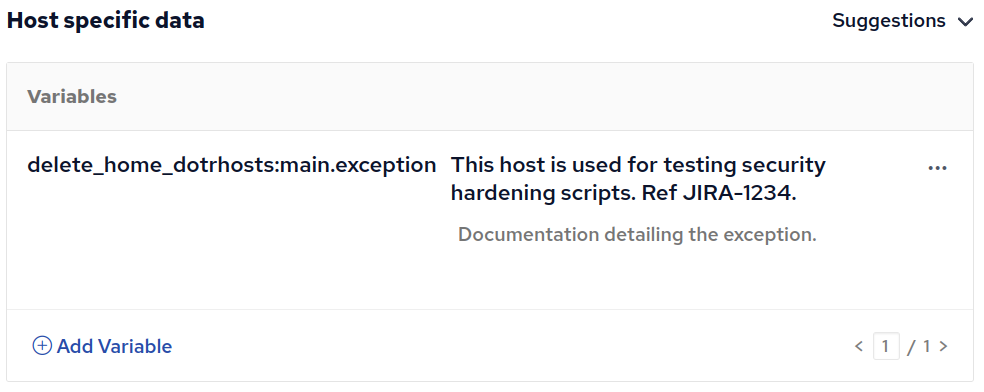delete-home-dotrhosts
Installation
cfbs add delete-home-dotrhosts
~/.rhosts (in each user’s home directory) is the user equivalent of to /etc/hosts.equiv. It contains a list of host-user combinations.
If a host-user combination is present in the file, the listed user is authorized to log in remotely from the associated host without further authentication.
The global /etc/hosts.equiv (controlled by an administrator) is preferable to allowing any user the ability to grant access to other users.
Recommendation: Do not allow user defined host based authentication. Use this delete-home-dotrhosts module to inventory and delete ~/.rhosts files. This ensures you are protected in the future, if somebody adds a ~/.rhosts file.
Inventory
With Mission Portal you can find hosts which have ~/.rhosts files and details about reasons for exception:
Example
If you try creating a ~/.rhosts file running the agent with this module, you should see it get removed:
Example output with an exception present:
$ sudo touch /root/.rhosts /home/vagrant/.rhosts
# sudo cf-agent -KI
R: Found /home/vagrant/.rhosts, /root/.rhosts, but not removing because of exception: I got an exception for .rhosts from the security czar. See JIRA-1234 for more info.
Example output without exception present:
$ sudo cf-agent -KI
info: Deleted file '/home/vagrant/.rhosts'
info: Deleted file '/root/.rhosts'
Configuration
Specifying home directory roots to search
Define a variable delete_home_dotrhosts:main.home_dir_roots as a string list with each element being a home directory root to search.
One easy way to define a variable is using augments (another is using Host specific data, as seen below).
Adding exceptions
If ~/.rhosts files are really needed on some hosts, you can add an exception in one of two ways:
- Define the
exception_delete_home_rotshostsclass. - Define the
delete_home_dotrhosts:main.exceptionvariable as a string with the reason for the exception as its value.
Functionally, they do the same, but the variable allows you to more richly communicate the reasons for exceptions in an Inventory report (as seen above). This can be done from the Host specific data section in host info pages inside Mission Portal, the CFEngine Enterprise Web UI. Here is an example of setting the variable:
Dependencies
This module has no dependencies

